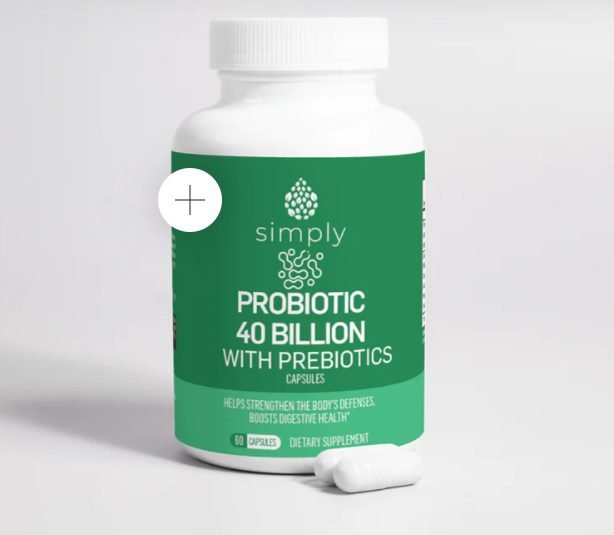Last Updated on January 10, 2026 by Rida Gul
Probiotics are recommended in various foods and drinks, such as the soft-serve ice cream at your neighborhood fro-yo shop and the kimchi that tops your fancy-schmancy sandwich. However, unlike the claims of some other dietary fads, probiotics have a robust body of evidence backing up their claims of benefit. When taken as a preventative measure, probiotics can either steer you in the right way or postpone the evolution of a condition heading in the opposite direction. Therefore, yes, you should go on this bandwagon.
Table of Contents
How do probiotics work?
In their simplest form, probiotics are living microorganisms like bacterial strains that, when consumed in sufficient quantities, benefit your health. They may be cultivated and produced in a laboratory, packaged as pills, powder, or other forms. In addition to that, you may find them naturally occurring in some fermented foods and beverages. The presence of probiotics in the digestive tract is associated with a return to normalcy, and a continuation of normal function, much like the role played by peacekeepers. And researchers are discovering that the use of probiotics to alter the bacteria balance in the gut may give a novel approach to the problem of how to keep people healthy.
What effects do probiotics have on the body?
They will make themselves home in your digestive tract for the time being. You must continue to consume probiotics to get the full advantages of having them in your body since they do not settle there permanently. It takes around five days of consistent use of probiotics for their presence to become noticeable in the body.
They explore their surroundings in great detail. The use of probiotics is astute. “Some of those that are helpful for diarrhea are also helpful for those with constipation. We believe that they go in, assess the situation, and then react by either reducing inflammation or increasing their immune approach in order to communicate with the “terrorists.” The vast majority of viruses have little interest in causing damage; they are content to merely eat and hang around. To speak in words that are more accessible to the general public, probiotics may be seen as saying, “We’ll let you survive, but you can’t discharge your poison.” Then, the organisms may generate molecules that stop the release of a toxin, therefore turning harmful bugs harmless.
They make the barrier in the intestines stronger. One layer of cells separates you from death in your digestive tract. This may seem dramatic, but it represents the ultra-thin barrier that lines your digestive tract. This barrier keeps contaminants out while allowing nutrients from food to flow through. If this barrier is breached, microorganisms may enter your circulation, causing you to get very ill. Probiotics strengthen the barrier by tightening the binding between cells and perhaps stimulating mucus production. This makes it more difficult for troublesome germs to cause havoc and makes it more likely that the barrier will be maintained.
They are responsible for cleaning up the slime.
In the event of an illness, bacteria will often produce a biofilm comparable to the slime that can eventually accumulate on the bottom of a boat.
Certain probiotics create a substance similar to soap, which helps break up the coating.
They starve out infections and eliminate them. Probiotics keep dangerous bacteria in control by making it difficult for them to survive, which they do by competing with the germs that cause illness for food.
What advantages do probiotics provide?
Consuming probiotics is beneficial for many factors, the two most important of which are the reduction in the likelihood of contracting an illness and the prevention or treatment of digestive system problems. The best time to observe the benefits of probiotics is when you are traveling, under a lot of stress, not eating properly, or not getting enough sleep. However, more recent studies show that probiotics may also help prevent or cure various other problems, including excessive cholesterol, allergies, and even anxiety. The reason why probiotics have such far-reaching impacts is because of what happens in your gut: It is the site of more nerve endings than any other part of the body (except the brain), and it is the nerve center from which your immune system operates.
Most modern-day Americans don’t receive the extensive exposure to microorganisms necessary to develop a healthy immune system. In addition, we utilize antimicrobials, which may be found in various soaps and even toothpaste, and which eliminate both good and harmful bacteria. Probiotics may bridge the gap.
Should I use a supplement that contains probiotics?
Probiotic foods should be your priority to receive possible advantages without taking any unnecessary dangers. Because the Food and Drug Administration does not regulate dietary supplements, there is no assurance that you will get the probiotics for which you have paid. A significant amount of study has been done on probiotic supplements, and the findings suggest that the benefits are extremely dependent on your genetic makeup and the bacteria that live in your gut. In other words, the outcomes are very much tailored to the person.
Before taking any new Simply supplement, especially probiotics, you should consult your primary care physician first. In some circumstances, such as when you have an illness that wipes out your gastrointestinal flora or when you take antibiotics, you may want to consider adding one (both good and bad).
Apart from that, if you are interested to know about What Is Osgood then visit our Health category.























